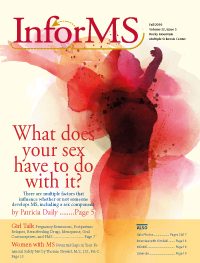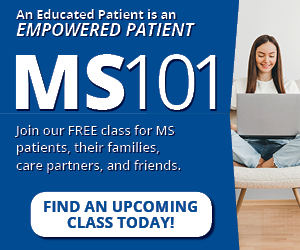
Having MS does not appear to affect a woman’s ability to become pregnant. When infertility is a problem, it is likely caused by something other than MS.
Pregnancy and pregnancy hormones affect MS. The high levels of hormones associated with pregnancy have a dampening effect on disease activity especially during the last trimester, when the relapse rates declines significantly. Relapse rates rebound in the first three months after delivery and this corresponds with a sharp decline in estrogens. In approximate numbers, for people with RRMS, the average annual relapse rate is 0.7 relapses per year. In about 40 percent of post partum women the relapse rates nearly doubles in the first three months post partum. The best, but still weak, predictor of a relapse is a higher level of disease activity prior to and during pregnancy.
Pregnancy appears to have beneficial effects on MS and women generally have significantly fewer MS-related problems during those nine months.
Given the probable pregnancy remission and the potential postpartum rebound, what do we know about the long-term effects of pregnancy on MS? The 2004 Pregnancy in MS (PRISM) study followed women for two years to assess the overall effect of pregnancy and concluded that it is probably a wash. More recently, several small studies suggested that pregnancy might even slightly delay the development of MS related disability down the road. A 2012 Australian study found that multiple pregnancies and younger maternal age might have a positive protective effect and speculated that a potential explanation for the increased incidence of MS in women, but not men, might be because women are having fewer children and having them later.
Breastfeeding
MS, by itself, does not pose any obstacles to breastfeeding. Because it affects hormone levels, might breastfeeding help prevent postpartum relapses? There have been several studies that looked at this and the data is mixed. A recent study done in California found that women who breastfed exclusively had a lower relapse rate than those who didn’t breastfeed at all or didn’t do it exclusively.
The concern about breastfeeding is whether nursing mothers can simultaneously use disease-modifying therapies. To prevent possible post partum relapses the recommendation is frequently to resume the use of DMTs as soon as possible. Many women are reluctant to do this because they want to nurse their babies, and some women are reluctant to nurse because they want to get back on DMTs. The question is whether this is an either-or situation. And, unfortunately, there is not much agreement about the answer.
What About Those Drugs?
The standard treatment recommendation today for people with relapsing types of MS is to use a disease modifying therapy. It is also a standard practice to advise pregnant women to avoid medications during pregnancy, especially the first trimester, and while nursing. What does this mean for someone who has MS and is pregnant or contemplating pregnancy?
The FDA gives a drug a safety category rating based on what is known about its potential for causing birth defects or other problems during pregnancy and while breastfeeding. Most of the disease modifying therapies used in MS, with the exception of Copaxone and Aubagio, have a category C rating which means that either adverse fetal effects have been found in animal studies and there are no studies in women, or there are no studies in either group. What “C” means in practice is that pregnant women are cautioned against using these medications unless the benefits justify the potential risks.
Aubagio carries a category X rating. This means that it can cause fetal abnormalities, so the drug is contraindicated for anyone—male or female—who is contemplating pregnancy or is pregnant. Category X is also reserved for those drugs that have no benefit in pregnancy. Oral contraceptives, for obvious reasons, are not used during pregnancy, and are also listed as category X drugs.
Copaxone has a category B rating, which means that animal studies have failed to demonstrate a fetal risk and there are no adequate studies in pregnant women. In practical terms this means that if there is a clinical need for a drug in this category, it is considered safe to use. Tylenol, insulin and ibuprophen are other drugs in this category.
To receive a category A rating requires controlled studies in pregnant women that demonstrate no risk of fetal harm. Folic acid, often actually prescribed to pregnant women for the prevention of miscarriage and thyroid medications are in this category.
Pregnancy is a time when, medically, we are very conservative. To receive a category A rating the FDA requires a relatively large amount of high-quality data, so a medication is presumed guilty until it is proven innocent. Because ethical constraints prohibit testing potentially harmful drugs on pregnant women, most drugs are never put on trial, so they rarely have the opportunity to prove their innocence. Drugs that are in category C in the US are often category A drugs in other countries.
However, the FDA recently revised its category guidelines and will no longer assign new drugs to these categories. Instead they will require package inserts that contain more concrete information about known risks in pregnancy. In some chronic conditions, pregnancy has a better outcome when the condition is treated instead of taking the woman off medication because the potential risks to the fetus may be less than the probably risks for the mother. The motivation for the revision to FDA guidelines is to encourage a more thoughtful conversation between pregnant women and healthcare providers about the benefits and the risks of remaining on medication
There isn’t an agreed upon protocol for the use of DMTs in pregnancy. Many physicians recommend that DMTs be stopped as soon as pregnancy is identified. Others—a growing minority—believe that while DMTs pose risks, so does untreated disease, so they and their patients frequently choose to use a DMT during pregnancy. There is not consensus on this issue and there are not established clinical guidelines. The best current recommendation is to make that decision based on how stable the woman’s MS is and that when a DMT is indicated, Copaxone is probably the safest drug to use.
There is no single right answer. The optimal (though often unrealistic) strategy is to plan a pregnancy and to consult closely with your neurologist and your OB to implement a plan that works for you, your partner, and your developing baby. If you intend to discontinue DMTs, it is a good idea to have MS under the best possible control before conception, and to minimize the time that you are off medication and your MS is unprotected. Consulting with a neurologist who specializes in MS can be helpful, to assess the status of your MS and the risks of using or not using DMTs while pregnant and nursing. Many women choose an obstetrician who specializes in high-risk pregnancies, not because an MS pregnancy is necessarily high risk, but because these specialists are better equipped to deal with the questions of using medications, should the need arise to do so.
Menopause, Oral Contraceptives, and PMS
Women often report that their MS symptoms are much more noticeable in the week before their period which is the time during the menstrual cycles when estrogen levels peak. Symptoms intensification tends to subside when the hormones do. Some research has looked at whether the menstrual cycle is a possible trigger for exacerbations and—surprise—the results were inconclusive.
What about oral contraceptives? Do they help moderate MS symptoms and might they possibly offer some protection against developing MS in the first place? One large study found that the incidence rate of MS among oral contraceptive uses was not decreased compared to women who had never used the pill. Another study suggested that they might. Generally, birth control pills, which create a state similar to pregnancy, don’t appear to have a soothing effect on MS.
Some women report that MS becomes more severe after menopause. This topic has not been well studied but there is some suggestion that there is increasing disease severity after menopause, even after taking age (which is also associated with progressive disease) into account. Does hormone replacement therapy (HRT) help? We don’t know. In theory it seems like it should. The use of HRT has declined among all menopausal women for the past decade because of concerns that it contributes to other health problems, so there just isn’t much data on hormone replacement therapy in menopausal women with MS.






